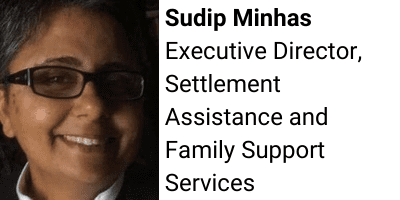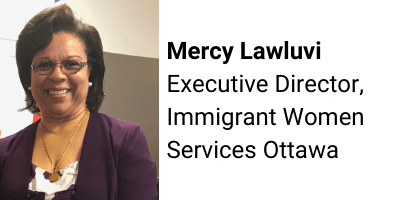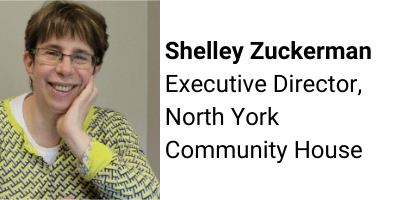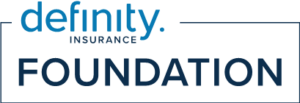Settlement services
Leading the way to decent work: settlement organizations share their experiences
Building a culture of decent work in nonprofit organizations requires flexibility, creativity, and tenacity. These qualities helped shape decent work journeys of three different agencies that support newcomers in Ontario. ONN recently sat down with Sudip Minhas, Executive Director of Settlement Assistance and Family Support Services, Mercy Lawluvi, Executive Director of Immigrant Women Services Ottawa, and Shelley Zuckerman, Executive Director of North York Community House. All three organizations are members of the Ontario Council of Agencies Serving Immigrants, an ardent supporter of decent work in the nonprofit sector.



Our conversation touched on a number of areas, but when it comes to decent work, Minhas, Lawluvi, and Zuckerman agreed on a few key points to building successful practices and policies:
- Decent work needs champions: Leadership, of course, needs to lead, but decent work culture requires active engagement from staff throughout the organization, providing direction and feedback along the journey
- Boards need to be on board: Directors not only need to understand and commit to an organization’s values, but also need to be involved in developing effective, sustainable, and long-term strategies
- Show and tell with funders: Engage funding bodies in conversations about decent work and how they can support it – but be sure to show your organization’s resiliency, creativity, and effectiveness in building a deeper impact, particularly during times of crisis like the COVID-19 pandemic
ONN: How did you start your decent work journey?
Shelley Zuckerman (SZ): We got involved several years ago through our membership with Toronto Neighborhood Centres (TNC). They were working with ONN quite early in terms of advocating decent work and brought that to our organization, all our organizations. We had, as an organization, always prioritized, staff and the needs of staff and trying to be as good a player as possible. But we felt we could do better. Our senior management team went through the decent work checklist, and analyzed and reviewed where we were at with the checklist and then identified the areas that we felt we needed to work on and be stronger. We then brought that to our board of directors and we had some conversations about areas we wanted to work on and they adopted decent work.
Sudip Minhas (SM): My foray into the terminology of decent work really started when I was ED of Windsor Women Working with Immigrant Women (WW). I also joined the membership of ONN and then served on the ONN policy committee as a member. So the terminology of decent work started at WW and also I taught feminist literature and feminist theory for 20 years in my past life so I always approached my work at the agency from that perspective.
When I worked at WW I was able to introduce a decent work fair wage policy and that meant that actually they continue to be the highest paid settlement staff in the Windsor region. I also opened a child-minding program that was funded by Immigration, Refugees and Citizenship Canada (IRCC). We had space and we also used to get students to do their placement at childminding. And we also had volunteers. We provided fair wages and introduced policies where staff, especially women, could utilize childcare as well as go for higher learning or for their skills training. A lot of them actually went back to university; I had two staff finish their PhDs.
Mercy Lawluvi (ML): I’m the beneficiary of a lot of work that had been done by the former executive director. She had done a lot of work, as far as decent work is concerned. I did download the decent work checklist and I was pleasantly surprised at the number of “best” ratings that I was marking off for our organization – so credit to her for doing all that foundational work.
One challenge was the issue of compensation, issues like salary increases and pay equity. We brought these issues to the board to try to move forward on them.
ONN: How easy or difficult was it to build that culture of decent work?
SZ: Our board was very supportive. They agreed to sign the charter and are really committed to it. They took a lot of pride in that.
ML: We also took the issue of compensation to our board and they were extremely supportive. In fact, the board took it upon themselves to conduct a salary scale comparison of our agency with agencies with similar service mandates, and we were not happy with the results. So we had to do something about this and when the opportunity presented itself, we applied for capacity building funding to help close the existing salary gap for our staff through a fund development initiative. So we are currently building on that fund development initiative to be able to achieve our goal of bridging that salary gap, because it was obvious when we did the comparative analysis that we as a women’s organization were earning less than other agencies doing comparable work.
SZ: About two, two and a half years ago, we did a comprehensive compensation report. We looked at salaries, and looked at where we were at with all our key positions, from childcare workers to frontline workers to managers to directors. And overall, we found we were kind of in the middle – and that wasn’t good enough for us. The salaries that we compared ours to weren’t fabulous salaries to begin with so we developed a new salary scale based on increasing all positions, some maybe two or three per cent, some maybe 10 per cent.
IRCC is our biggest funder. And when we negotiated the contract for this last year for the next five years, we negotiated increases based on the compensation review and did it over two years, and then negotiated a regular two per cent increase. We were actually quite lucky that we got to a position where our biggest funder agreed to it. And last year we joined the OPTrust Select pension plan. And so now all our staff (part-time and full-time) have access to a pension plan, which we’re quite excited about.
ML: I think we’re moving in the same direction as well. We also negotiated with IRCC for an increase. We had a bigger increase in the first year and then a two per cent increase subsequently for the remainder of the five years. We also increased our RRSPs.
ONN: It seems like you all have really supportive boards. What is the secret to a good board?
SZ: That’s a good question. Sometimes it’s a bit of luck. But I think for us, one of the things is that when we do recruit board members, we really do talk about our values and our culture, and how staff are really important – prioritizing decent work. So when we raise issues related to decent work or compensation they’re really supportive.
ML: I think part of it is ensuring that the board has those values, and that the leadership of the board is really strong in terms of commitment to decent work.
SM: I’ve had experience with all kinds of boards, and it’s important to make sure that members actually believe in those values when they join a board. I also think it’s important to have staggered board recruitment. So you don’t see all of the board leave and an entirely new board comes in and faces a learning curve all over again. But another important thing I’ve noticed is how the executive director engages the board, communicates about the values of the organization. It is always good to add a paragraph at the end of your ED report talking about those values so that they are reminded of what we do and how we do it.
ONN: What sorts of decent work policies or practices are you most proud of in your organizations?
ML: We are a group of women, mostly immigrant women from different parts of the world, providing services to immigrant women here in Ottawa. So our job can be very stressful, working with women fleeing violence, and those who are striving to settle into a new environment, and it’s even worse during the pandemic. So we have created a work environment where the staff are very supportive of each other. We have regular check-ins. We have an annual retreat, where half the day is spent team building and decompressing. There’s also Zumba (dancing) available in the building once a week. We try to keep staff wellness in mind in addition to our benefits, which include an employee assistance program.
SM: At our organization, I was recently able to find a better benefit plan for the staff. We have dental and vision coverage up to one hundred per cent, as well as family benefits. I also have a dream inspired by the Grameen Bank in Bangladesh, where women made their own bank offering small loans. Those kinds of cooperative movements can play an important role among newcomers. Even though they may have fewer resources, they can pool them to help each other. It’s important that they have financial stability.
SZ: At different points, we’ve had organizational supports, like social committees and mental health committees, that help us look at how to support each other. It’s also really important that we have opportunities for staff development and learning. Now during the COVID pandemic, we encourage staff to attend webinars and other online opportunities.
A couple of years ago, we worked with an outside facilitator to ask teams to develop new ideas or projects. Teams could put together a proposal and present it to leadership. One of the things our childcare team suggested was an online tool called HiMama, which connects parents of the children in our care to each other, and gives them access to information from the organization. It’s been an amazing project that has worked so well during COVID, because it gives parents and childcare workers an opportunity to stay in touch with each other.
ML: When COVID started, our facilities were closed. But we also started online programming for children where early childhood educators would provide sessions for newcomers and their children, maybe storytelling, playing games, dancing, music. Mothers got some time to chill while their children were engaged in online activities. We’ve received a lot of appreciation from our clients.
ONN: Back to the microcredit idea for a moment, Sudip. Would you hope to offer something to both employees and clients alike?
SM: Yes. But we couldn’t do it as an agency, as we don’t have reserves and can’t really offer money. But I thought maybe we could support people setting it up themselves to help each other.
SZ: Sudip, I’d be really interested in talking with you more about this. I’d love to think more about what we can do, not just as an organization, but maybe as a group.
ML: This dream of yours happens in a lot of places in the world. I know in my corner of the woods, it does happen where women would come together and contribute a sum every month. And then when there’s a bulk sum, it goes to someone who needs it. Once the logistics are sorted out, we would like to be on board with that too, because it will be beneficial to our clients and to our staff. As this dream unfolds, we would definitely like to join in on it.
ONN: You mentioned earlier working with funders to build decent work. And with the COVID pandemic, many funding organizations have become more flexible or open in how their support is used. Is there an opening now for engaging funders to support decent work? And if so, how would you suggest having those conversations?
SZ: It’s interesting, because our funders, both from foundations and government, have become much more flexible. We’ve shown we can work responsibly and have helped build trust. We’ve shown we can pivot. One day we were all operating in our office and practically the next day we went remote and changed all our services to remote services. I’ve just been absolutely amazed at our staff’s ability, and am so proud. This is the time when funders are flexible. This is a time to experiment, and staff really took that on.
ML: It is my hope that the funders will continue moving forward. It will be important for us to focus on the impact during this time so they can see the return on their investment. We need to show the impact that their flexibility has afforded us.
ONN: What insights, suggestions, or advice would you share with other organizations looking to start their own decent work journey?
SM: Having happy, healthy, and respected staff leads to a productive organization. It fosters a commitment to the organization. In the nonprofit sector, we espouse decent work values, but don’t always live those values.
SZ: I agree. I think it’s all about culture. You need to value and trust staff. And as a leader, sometimes you’ve got to figure out how best to build on your values. We did it with compensation; it took a long time, but we tried different things and had to be creative.
ML: I would add that the decent work checklist would be a great place for nonprofits to start. Go through the list and make sure you congratulate yourselves on the best practices already in place, but also work on what needs to be improved. And find creative ways of overcoming challenges. Think outside the box.


